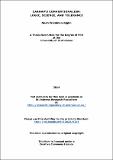Files in this item
Carnap's conventionalism : logic, science, and tolerance
Item metadata
| dc.contributor.advisor | Milne, Peter | |
| dc.contributor.author | Friedman-Biglin, Noah | |
| dc.coverage.spatial | 138 | en_US |
| dc.date.accessioned | 2015-03-26T09:52:31Z | |
| dc.date.available | 2015-03-26T09:52:31Z | |
| dc.date.issued | 2014-06-26 | |
| dc.identifier.uri | https://hdl.handle.net/10023/6334 | |
| dc.description.abstract | In broadest terms, this thesis is concerned to answer the question of whether the view that arithmetic is analytic can be maintained consistently. Lest there be much suspense, I will conclude that it can. Those who disagree claim that accounts which defend the analyticity of arithmetic are either unable to give a satisfactory account of the foundations of mathematics due to the incompleteness theorems, or, if steps are taken to mitigate incompleteness, then the view loses the ability to account for the applicability of mathematics in the sciences. I will show that this criticism is not successful against every view whereby arithmetic is analytic by showing that the brand of "conventionalism" about mathematics that Rudolf Carnap advocated in the 1930s, especially in Logical Syntax of Language, does not suffer from these difficulties. There, Carnap develops an account of logic and mathematics that ensures the analyticity of both. It is based on his famous "Principle of Tolerance", and so the major focus of this thesis will to defend this principle from certain criticisms that have arisen in the 80 years since the book was published. I claim that these criticisms all share certain misunderstandings of the principle, and, because my diagnosis of the critiques is that they misunderstand Carnap, the defense I will give is of a primarily historical and exegetical nature. Again speaking broadly, the defense will be split into two parts: one primarily historical and the other argumentative. The historical section concerns the development of Carnap's views on logic and mathematics, from their beginnings in Frege's lectures up through the publication of Logical Syntax. Though this material is well-trod ground, it is necessary background for the second part. In part two we shift gears, and leave aside the historical development of Carnap's views to examine a certain family of critiques of it. We focus on the version due to Kurt Gödel, but also explore four others found in the literature. In the final chapter, I develop a reading of Carnap's Principle - the `wide' reading. It is one whereby there are no antecedent constraints on the construction of linguistic frameworks. I argue that this reading of the principle resolves the purported problems. Though this thesis is not a vindication of Carnap's view of logic and mathematics tout court, it does show that the view has more plausibility than is commonly thought. | en_US |
| dc.language.iso | en | en_US |
| dc.publisher | University of St Andrews | |
| dc.rights | Creative Commons Attribution-NonCommercial-NoDerivatives 4.0 International | |
| dc.rights.uri | http://creativecommons.org/licenses/by-nc-nd/4.0/ | |
| dc.subject | Rudolf Carnap | en_US |
| dc.subject | Principle of tolerance | en_US |
| dc.subject | Logical pluralism | en_US |
| dc.subject | History of analytic philosophy | en_US |
| dc.subject | Vienna Circle | en_US |
| dc.subject | History of logic | en_US |
| dc.subject | Philosophy of logic | en_US |
| dc.subject | Philosophy of mathematics | en_US |
| dc.subject.lcsh | Carnap, Rudolf, 1891-1970 | en_US |
| dc.subject.lcsh | Analysis (Philosophy)--History--20th century | en_US |
| dc.subject.lcsh | Logic | en_US |
| dc.title | Carnap's conventionalism : logic, science, and tolerance | en_US |
| dc.type | Thesis | en_US |
| dc.type.qualificationlevel | Doctoral | en_US |
| dc.type.qualificationname | PhD Doctor of Philosophy | en_US |
| dc.publisher.institution | The University of St Andrews | en_US |
| dc.publisher.department | Arché Philosophical Research Centre for Logic, Language, Metaphysics, and Epistemology | en_US |
This item appears in the following Collection(s)
Except where otherwise noted within the work, this item's licence for re-use is described as Creative Commons Attribution-NonCommercial-NoDerivatives 4.0 International
Items in the St Andrews Research Repository are protected by copyright, with all rights reserved, unless otherwise indicated.


